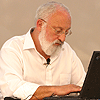What Does a Fallow Year Have to Do with Rice? – an Article about the Food Crisis
 The following is a translation of an article about the global food crisis that was recently published in one of Israel’s leading newspapers, Yediot Aharonot:
The following is a translation of an article about the global food crisis that was recently published in one of Israel’s leading newspapers, Yediot Aharonot:
What Does a Fallow Year Have to Do with Rice?
Next Sabbath we are going to read Parashat BaHar (a weekly Torah portion), which deals with one of the most ancient and complex precepts that were entrusted with the people of Israel – the precept of a fallow year. Once every seven years the people of Israel are commanded to rest from cultivating the fields and leave the fruit to whoever wishes to pick it. What will we eat in the eighth year? The answer is that in the sixth year there will be enough crops to feed on, and even in the ninth year.
It may be symbolic that precisely on a fallow year, when we are promised to have no shortage, we are facing the beginning of a serious global food crisis. Even if we overlook media spins, which were probably meant to raise the price of rice, we cannot keep ignoring the fact that the American and global economy are already in a deep crisis. This crisis is likely to plunge us all into a deep recession, affect the structure of society, and shake relationships between various nations and economies.
But what is causing this crazy turbulence, and how do we curb the erosion? Or in other words, what does a fallow year have to do with the stock market in Chicago? Here is the gist of the Kabbalistic explanation to the crisis, along with suggestions for a solution.
In economy, just as with any social system, interdependence is the name of the game. Crises where one factor “infects” others and brings the market to the verge of collapse are part of the symptoms of modern economic globalization. However, the attempt to predict economic crises using sophisticated models has failed time after time. It turns out, that the economic system cannot be controlled or predicted accurately, and an action in one place causes far reaching changes in other, unexpected places.
Professor Günter Blobel, M.D., Ph.D., awarded the 1999 Nobel Prize in Physiology and Medicine, in addition to being a senior investigator at the Rockefeller Institute in New York, was quoted recently as saying that, “Even science believes that the principle of interdependence is the key to the existence of every system in nature. An example for that are the cells in the human body: They connect to one another through mutual giving for the sake of the whole body. Every cell in the body receives what it needs to exist, and applies the rest of its strength toward the whole body.”
In their writings, the Kabbalistic sages also describe an “upper nature” as a force that envelops the whole of reality with goodness and love, and they explain that its purpose is to bring all the elements of reality into balance and harmony with it. Once we understand the laws by which nature’s system operates, and act accordingly, we may be able to prevent the next collapse.
Indeed, a close look at the relationships in nature will show that the balance and harmony taking place there are what enables life itself. In contrast, opposite laws are carried out in the artificial systems established by human society. At the foundation of human behavior stands the ego, which always prefers the narrow, personal interest of the individual, over the common good.
The more we try to seclude ourselves, the more we discover how interconnected we are. On the one hand, the ego is pushing us to separate from each other, and on the other, globalization is pressuring us to realize our natural interconnection, and hence unite, like the cells of a living body.
In order for a social system to survive it must be based on the laws of nature. The solution lies in education, and therefore, Kabbalah recommends a number of basic steps:
1. Hitching the various media channels to provide the public with the understanding that we are one multi-cellular body, and that we are all interconnected. Every cell of the human system will have to understand that the most profitable model for him- or her is the happiness of the whole.
2. Clearly showing the world the severity of the crisis we are in, and the true reasons for it: Consistent, ongoing violation of the laws by which nature’s systems are run, something that blatantly disrupts the balance in our world.
3. Establish a proper explanatory system that can bring about a change in public opinion, so that decision makers will have to learn how to balance man made systems with nature’s system.
In the book of Leviticus, the term “holiness” is first used in reference to one’s relationship with another and with the environment. When these relationships are aimed at a higher goal than fulfilling one’s egoistic needs, they can be used as a means to live a balanced life. If we come to understand that we are one society, and use the power at our disposal to change the relationships between us – from separation to unity – we will also succeed in getting the world out of the crisis it is in, and lead it to safety.
Related Posts:
* The Food Crisis – Rising Food Prices and the Meaning of Life
* Article in the Newspaper “Yediot Aharonot”







Discussion | Share Feedback | Ask a question